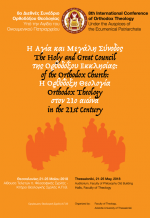Citation:

Date Presented:
24 May 2018Abstract:
Fasting is undeniably one of the religious practices that form the identity of the members of the Orthodox Church. Among other points, the official document on fasting of the Holy and Great Council of Crete focuses on the need for the local Churches to apply the principle of oikonomia when necessary. However, in the pertinent argumentation, there is hardly any reference to the relevant witness of the New Testament. The present paper attempts to fill in this blank by presenting St. Paul’s teaching on abstinence from idol food as an important contribution to this discussion.
While Paul is not interested in the practice of fasting per se, he is concerned with the problem of believers eating or avoiding idol food. According to him, Christians with a strong conscience should feel free to consume idol food. However, they also have to take into account their brethren with a weak conscience who think of such practice as participation in idolatry. If necessary, the first ones should be even prepared to give up their right of eating meat so as not to scandalize the latter. It is then clear that St. Paul understands abstinence from food as a condescension to spiritual weakness.
Contemporary civilization has created new serious health disorders, which are partly due to modern-day eating habits. For this, as well as for other reasons, many Christians nowadays cannot and should not be fasting in the traditional way. Taking into consideration the Pauline testimony, the historical diversity of the practice of fasting, as well as the complexity of contemporary problems, an individualized understanding and application of both akribeia and oikonomia is required. In addition, Church members should be encouraged to reach spiritual maturity, so that they are able to take responsibility for both their spiritual and their physical health.

